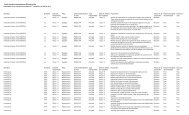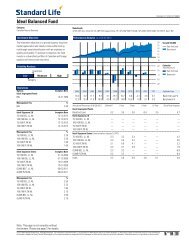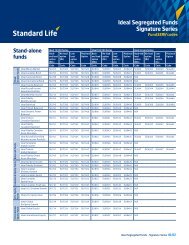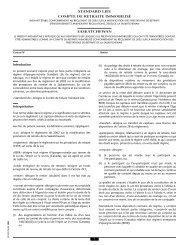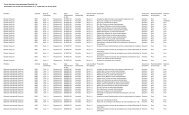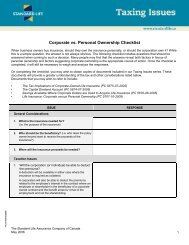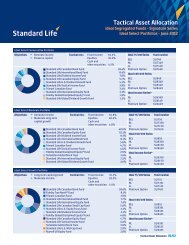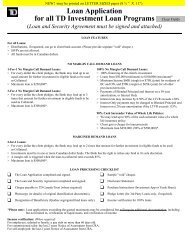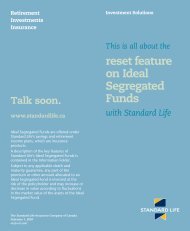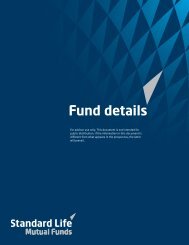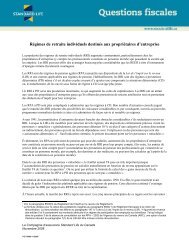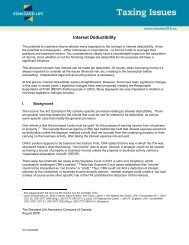Standard Life Canadian Equity Class
Standard Life Canadian Equity Class
Standard Life Canadian Equity Class
Create successful ePaper yourself
Turn your PDF publications into a flip-book with our unique Google optimized e-Paper software.
than what had been feared. Future issues yet<br />
to be resolved include the cost of settling the<br />
foreclosure lawsuits with the state attorney<br />
generals. In June, JPMorgan Chase and Bank of<br />
America have agreed to settle with the SEC on<br />
this issue, though the state attorney generals’<br />
lawsuit could be much more severe.<br />
Japanese companies reported lower earnings due<br />
to a strong yen, business disruptions and parts<br />
shortages after the tsunami. Otherwise, corporate<br />
earnings were surprisingly strong once again, and<br />
guidance was positive. It is estimated that half<br />
of the revenues generated by the large American<br />
corporations come from overseas. Since the<br />
onslaught of the recession, companies slashed<br />
their costs to increase profitability. However,<br />
the rise in raw material costs is expected to<br />
squeeze margins. Companies continued to<br />
spend their cash making acquisitions and<br />
capital expenditures.<br />
Concerns over sovereign debt default continued<br />
to unsettle international markets. French and<br />
German banks that are heavily exposed to Greek<br />
debt have struck a deal with their respective<br />
governments to rollover a certain amount of the<br />
maturing debt they hold.<br />
Fixed Income<br />
Positive returns in the bond market were achieved<br />
in the second quarter and year-to-date, erasing<br />
the first quarter losses. As the economic data<br />
pointed towards slower global economic growth<br />
and the sovereign debt problems in Europe<br />
resurfaced, a flight to quality ensued and yields<br />
on government bonds fell. The yield on 10-year<br />
U.S. Treasury Bonds fell by approximately<br />
60 basis points since their February highs. A<br />
resolution to lift the debt ceiling in the U.S.<br />
before the August deadline has almost fallen<br />
off the radar as the focus was on Greece and<br />
Europe’s attempts to resolve the looming<br />
sovereign debt problem. Meanwhile, several<br />
emerging countries continued to raise interest<br />
rates in an attempt to curb domestic inflation.<br />
This commentary represents the opinion of <strong>Standard</strong> <strong>Life</strong> Investments Inc.<br />
Long government bonds outperformed. Extremely<br />
low rates and a limited appetite for risk kept<br />
buyers on the sidelines for provincial bonds.<br />
Spreads remained wide. The tone in the corporate<br />
bond market remained sour, particularly for U.S.<br />
financials. Demand was nevertheless strong for<br />
good quality issues with long maturities.<br />
The U.S. government’s quantitative easing<br />
program – otherwise known as QE2 in which the<br />
Treasury purchased bonds in the market – ended<br />
at the end of June and there were no plans to go<br />
into another easing program.<br />
Outlook<br />
We believe that this is a mid-cycle slowdown,<br />
much like a year ago and we expect growth to<br />
resume in the second half of this year. Headline<br />
inflation will be peak in tandem with the price<br />
of oil. In fact, it may have already peaked.<br />
Lower energy prices and stimulative monetary<br />
conditions in North America are starting to<br />
translate in some auto and business loan activity.<br />
Growth in China should resume as inflation<br />
looks to be tamed, thus generating an increase<br />
in demand for commodities. And finally, the<br />
Japanese economy should recover due to the<br />
reconstruction following last March’s earthquake<br />
and tsunami.<br />
The equity market pullback increased the<br />
attractiveness of equities. Valuations are<br />
reasonable. <strong>Equity</strong> markets should be sustained<br />
by increasing worldwide demand, solid corporate<br />
fundamentals and earnings growth, albeit at a<br />
slower pace than in the last few quarters.<br />
Interest rates are not expected to increase in the<br />
forthcoming period as growth in the developed<br />
economies is fragile and the sovereign debt<br />
problem persists. Inflation is not an issue.<br />
We expect bonds to trade within a range over<br />
the next year. Credit bonds remain attractive<br />
as yield spreads relative to government<br />
bonds remain wide.<br />
The Quarterly Review 07



